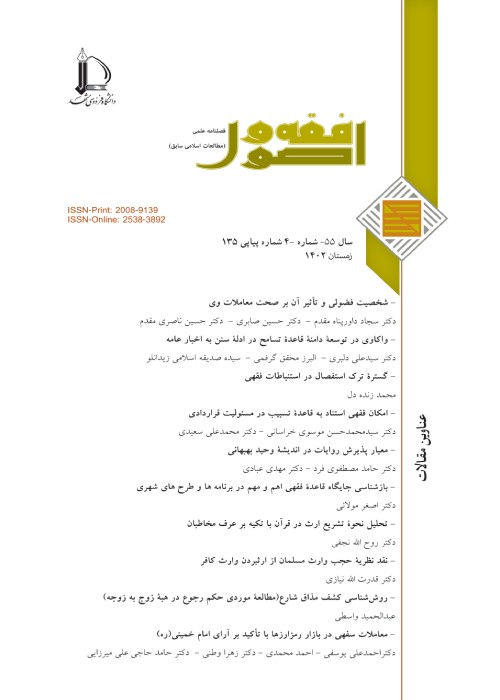Study of Muḥaqqiq Isfahānī's Viewpoint on Ownership, Right, and Decree
Author(s):
Abstract:
The ownership that involves transactions and barters is subject to the validity of the intellectuals and the lawmaker، which is created by hypothetical (i‘tibārī) existence and can somehow be called a hypothetical relation for whose validity the existence of local convention is sufficient; therefore، ownership is neither among the categorical accidents، the existence of whose subjects is necessary in the outer world، nor like the mental conventions that resembles the concepts whose accidents and qualification are mental. Right (ḥaqq) is a specific capability that sometimes applies to physical goods (‘ayn)، sometimes to the contract، and sometimes to the person; such as the right of delimitation (taḥjīr)، the right of option (khiyār)، and the right of retaliation (qiṣāṣ). The object of right is in all cases an action that involves the physical goods، or person، or contract; whereas، property is a possession or domination that in reality involves the very physical good، or benefit، or action. Therefore، since the property is essential for absolute domination and the right is regarded as a special credit in some specific appropriations، the right cannot be considered as the property itself; and، furthermore، since property is by nature a simple issue and non-gradational، the right cannot be considered as a degree of the property. Besides، in some rights، including the right of delimitation and the right of specification (ikhtiṣāṣ)، ownership is essentially out of question. Given its specifications، right is principally conveyable، relinquishable، transferable to inheritance except in cases in which a specific reason prohibits all or a part of appropriations and everything that is in nature characterized by right is apt to relinquish، otherwise it is regarded as a decree، in which case it is not relinquished except by compliance with decree or denial of the subject. Since evidences for transactions stand as enforcement of legal means، if in cases of doubt، there is certainty about transferability and doubt in deterrence or conditionality is the specific cause، the generality of the evidence of condition or amicable settlement (ṣulḥ) would be executed; and if doubt is in the transferability itself، the principle is the non-acceptance of transference.
Keywords:
Language:
Persian
Published:
Islamic Jurisprudence & Its Principles, Volume:45 Issue: 92, 2013
Page:
53
magiran.com/p1173324
دانلود و مطالعه متن این مقاله با یکی از روشهای زیر امکان پذیر است:
اشتراک شخصی
با عضویت و پرداخت آنلاین حق اشتراک یکساله به مبلغ 1,390,000ريال میتوانید 70 عنوان مطلب دانلود کنید!
اشتراک سازمانی
به کتابخانه دانشگاه یا محل کار خود پیشنهاد کنید تا اشتراک سازمانی این پایگاه را برای دسترسی نامحدود همه کاربران به متن مطالب تهیه نمایند!
توجه!
- حق عضویت دریافتی صرف حمایت از نشریات عضو و نگهداری، تکمیل و توسعه مگیران میشود.
- پرداخت حق اشتراک و دانلود مقالات اجازه بازنشر آن در سایر رسانههای چاپی و دیجیتال را به کاربر نمیدهد.
In order to view content subscription is required
Personal subscription
Subscribe magiran.com for 70 € euros via PayPal and download 70 articles during a year.
Organization subscription
Please contact us to subscribe your university or library for unlimited access!


